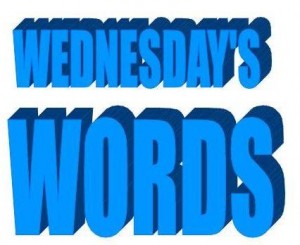Wednesday’s Words: Yipping at My Heels
 I just finished taking a look at two thrillers, both big, slick, well-touted works. Although they had interesting plots, there were so many point-of-view characters and so many incidents that the stories never seemed to go anywhere. I finally got tired of the words yip-yip-yipping at me and closed the books.
I just finished taking a look at two thrillers, both big, slick, well-touted works. Although they had interesting plots, there were so many point-of-view characters and so many incidents that the stories never seemed to go anywhere. I finally got tired of the words yip-yip-yipping at me and closed the books.
Ahh. Silence.
Three-hundred-page manuscripts used to be common, but the size of books grew along with the influence of corporate booksellers. Not only did large books make people think they were getting more for their money, they were well suited for mass displays. As with other merchandise, perception of worth apparently supersedes true value.
Big books are divided into short chapters and those chapters divided into smaller and smaller segments that make the book easy to put down and pick up at odd intervals for attention-challenged readers, but those small segments make it hard for a reader who wishes to identify with a character and be pulled into another reality.
Some books don’t lose anything by being big and thick. Although toward the end I did get a trifle tired of Stephen King’s latest work, he managed to keep my attention all the way through. No mean feat. But most big books today can do with some serious editing to better focus the plot and give some depth to the characters and stop that incessant yipping.
I used to feel guilty that my own books were only about three hundred pages; obviously something is wrong with me if other writers can churn out words by the hundreds of thousands. But I want my words to signify something, to be worth the time it takes to dig them out of my psyche. And I want my characters to be more than mere types. I don’t know if I will ever become the writer I wish to be, but I know one thing: I won’t be creating overblown, yippy works; the words come too hard. Besides, I would rather readers complain that my books are too short than slam them shut to get a bit of silence.



I read stories to entertain me and take away from where I am and into another place and time.
I think it’s the story that keeps you going and if the world is well crafted and the interaction of the characters within the world are *real* then I don’t care how long it is or what word choices the author uses.
When the author doesn’t keep my interest then the words bother me. But, honestly, when I read I don’t always pay attention to words. I’m in the story and the concepts not words. There are times I’ll see a turn of phrase that pulls me out of the story because I like the way it was put. Like looking at art or hearing a particularly beautiful piece of music. It’s the concept of the vision I love and am entertained by, not the details of the execution. Granted, I’ll notice if the perspective in the picture is off or if there is an off key in the music. But then, I’m not looking at it critically. I’m looking at it with the view of the overall enjoyment. I’m the same with books.
When it comes to reading a good book, I don’t want anything to pull me out of the story either with good words or bad. I want to be fully in the story not the details of creation of the story.
I’m guilty of liking long books. If I’m paying more than $20, I want something that will entertain me for longer than 2 hours. I admit I feel short-changed with shorter books.
But I certainly don’t want filler. Give me a good story and as Sia said, one that keeps me involved in the fiction. Don’t pull me out of this wonderful world at the climax by using some word or phrase that’s out of place. Nothing gets me grumpy more than someone pulling me out of a good story, be that a person from the real world interrupting when I’ve only got 15 pages left! or the writer who does something to draw attention to the mechanics and not the story. Let me race along in my imaginary world having imaginary adventures. That’s the reason I bought the book.
Don’t intrude with reality.
Good post, Pat.
These days when I’m reading, I’ve got the measuring stick out. As a writer, I look at the writer’s prose and start evaluating how it works for me. If the writer is effective, I’ll soon forget all of that and jump into their story. But if the writer uses lots of cliches or goes on and on about things I don’t care for, then it might just be time to find another book.